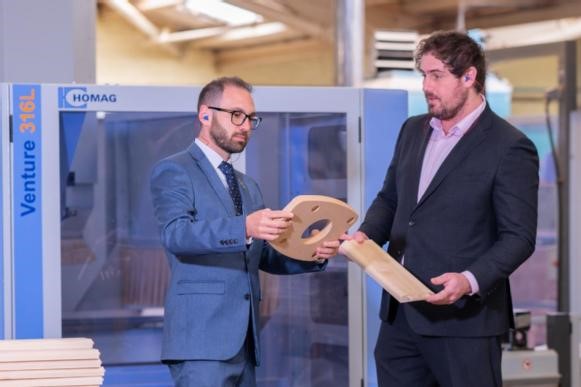Success Story Assetbank
A turnover and wellbeing boost at Wrekin Sheetmetal through Made Smarter support
“Working with Made Smarter and having the new system in place has been invaluable for us. It has dramatically improved our production line process and has not only made staff happier but has made it easier for us to onboard new colleagues and products thanks to the system’s ease-of-use.”
Claire Robinson, Managing Director, Wrekin Sheetmetal Ltd
Wrekin SheetmetalLink opens in a new window, based in Telford, manufactures and shapes a wide variety of steel parts and components for a range of sectors, including healthcare, automotive, aerospace, and retail.
Challenge
Although the company were thriving in some areas, there were issues with productivity and data visibility on the shopfloor. They were still printing technical drawings on paper and there were often bottlenecks as one department waited on information from another. The company were not optimised to take on new client products due to a lack of time to develop new processes. This was hindering their ability to grow.
Solution
Managing Director Claire Robinson got in touch with the Made Smarter West Midlands programme, who linked Claire with WMG Engineer, Manikanta Ravi. Mani, with the help of Intern Ravikishore Karuppuswamy, undertook a value stream mapping of Wrekin Sheetmetal’s complete manufacturing process from start to finish, to assess improvement opportunities. He recommended they install a suitable dashboarding solution integrated with current Enterprise Resource Planning (ERP) software MIE Track, using a network of tablets on every machine and in every department to monitor data. Together with WMG’s Denis PelychLink opens in a new window, Made Smarter assisted Wrekin Sheetmetal to access a match-funded grant of £20,000 towards the cost of the new system which reduced the risk associated with the investment.
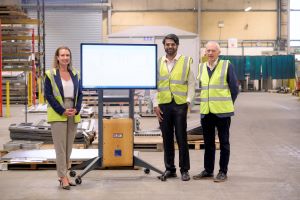
Impacts
- The new system has allowed Wrekin Sheetmetal to devote more time to new product development which will open new growth areas for the business and will help them meet its targets to double turnover by next year
- With the new system in place, Wrekin Sheetmetal are expected to grow capacity by between 10-15% and create seven new jobs
- Wrekin Sheetmetal is now a paperless operation and is using data to drive decision making
- Staff are highly motivated as they now have visibility of their activity, there is reduced time wastage, and they feel bought into the whole manufacturing process. Existing roles will benefit from upskilling going forward
WMG's Manikanta Ravi said:
“Key data such as machine uptime and downtime, technical drawings, and order information is now instantly accessible to every member of the team, with information constantly updated in real time.
The new system has meant the waste identified in our value stream mapping exercise, such as the time taken for the engineering team to pass on drawings to the shop floor team, has been virtually eliminated.”
For the full case study visit:
made-smarter-case-study-wrekin-sheetmetal.pdf (madesmarter.uk)
If you are a manufacturing organisation wanting to work with WMG’s SME team visit:
WMG SME Group Engagement Form (office.com)

Championing the importance of digital in manufacturing, Bridge Cheese picks up two business awards.
Telford based Bridge Cheese has gained two prestigious awards for the way it has harnessed digital technology to grow turnover to £30m in five years. Working with WMG through Made Smarter West Midlands, they have implemented a series of recommendations that have improved efficiency and enabled growth.
Background
Bridge CheeseLink opens in a new window, based in Telford, supplies a variety of cheese and dairy products to the wholesale market, with many of its customers working in the food service industry or food manufacturing. Since its inception in 2018, it has grown rapidly, achieving double-digit growth year-on-year.
Challenge
Bridge Cheese had a mission to double its turnover from £30 million to £60 million in three years. However, to mitigate the pressures of rising costs and to maximise profitability, the two directors Michael Harte and Martin Bowden knew they had to tackle the efficiency of their processes. They were also keen to address issues with stock control and production management.
Michael Harte said:
“We realised that for us to grow further, the analysis of our production processes and costs needed to be a lot better. We had previously relied on spreadsheets and paper records to monitor much of our business’s performance.”
They were aiming to create a smart paperless factory with some automation that would enable them to grow without too much additional labour.

Solution
Telford and Wrekin Council referred the duo to the Made Smarter West Midlands scheme and Made Smarter digital expert Martyn Mangan recommended WMG come in to undertake a thorough audit. This included a “Digital Roadmap” highlighting the steps needed to digitise the business and boost productivity.
WMG's Denis PelychLink opens in a new window worked with Bridge to understand their requirements and what was impeding their growth potential. He suggested a new Enterprise Resource Planning (ERP) system would help improve real time data and visibility to better manage processes. He reviewed various solutions and providers before recommending a specialist food industry package with proven integration to Sage 200, which they were currently using.
The software and services cost was £70k but through Made Smarter, Bridge was able to access a £20k grant. During 2023 using a phased approach, the company implemented the new system which included customised KPI/status dashboards for factory visibility and decision-support.
Impacts
Now up and running, the new system handles everything from tracking orders, stock taking, monitoring machine uptime and downtime, and producing instant quality control reports. Key expected benefits include:
· 20-30% year-on-year growth expected, from £30m to £60m+ revenue in 3 years, including increasing export sales from 2% to 20%+
· 100% reduction in ‘on-time delivery failures’ of orders, plus a saving of the time wasted resolving production issues due to stock issues
· 15-20% improvement in current process efficiency, from process automation across order processing, planning, and production execution
· 10-15% additional efficiency improvement through shop floor digitisation of food safety compliance data capture and management
· 50% reduction in stock days which is around £1.5million of cash freed up to support investment

The outstanding results led to Bridge Cheese being crowned as overall winner of the Made Smarter Adoption Award for the West Midlands region in Birmingham as well as in their own area of the Marches. They represented the West Midlands at the national Made Smarter Awards on 27th June.
Testimonials
“For SMEs like us, support from a scheme like Made Smarter is so important. As part of this journey, Denis’s role became akin to a “non-executive director” advising us in all matters IT related. We are now taking the next steps towards a digital future for our business, and we would encourage others in our position to do the same.”
Michael Harte, Director, Bridge Cheese Ltd
“Bridge Cheese were a delight to work with and are highly motivated to build on their already excellent reputation for service quality. The new system will enable them to achieve their growth ambition without any risk to delivering on client expectations. There are many additional areas that they can focus on with digital going forward such as further automation which is very exciting.”
Denis Pelych, Digital Manufacturing Advisor, WMG, University of Warwick
To find out more about working with WMG on digitising your business contact WMG's SME TeamLink opens in a new window
For further information on Bridge Cheese visit: Welcome to our World of Cheese - Bridge CheeseLink opens in a new window
To read the full story and watch the video about Bridge Cheese’s journey on Made Smarter visit: Case Study - Bridge Cheese | Made SmarterLink opens in a new window

Machine learning project automates complex tooling job at Expert Technologies Group
A two-year Knowledge Transfer Partnership (KTP) between WMG, University of Warwick and expert industrial automation specialist Expert Technologies GroupLink opens in a new window has introduced machine learning into a range of engineering settings that were previously thought too complex to implement. KTP Associate Mateusz Ogrodnik reduced the time of designing new mechanical fixture plans* from weeks to minutes.
Challenge
Historically the job of creating mechanical fixture plans was deemed too complex to automate. Despite involving repetitive tasks, the processes were too nuanced for simple automations to handle, and tooling designers were still an essential component.
However Expert Technologies were keen to devise and implement a novel approach to this unsolved problem, so that designers’ time could be better utilised on higher value, strategic tasks in the business.
The key challenge was the sheer computational complexity of this process. A typical fixture plan has around 40 elements which would mean that around 250 parameters had to be implemented into an automated solution.
As part of this project, Expert wanted to create and embed a systematic approach to solving complex engineering problems for the future. With the use of machine learning on an upward curve, this project would pave the way for them to continue to use this kind of technology for other hugely complex problems.
Solution
With the support of WMG, they opted to apply for an Innovate UK funded Knowledge Transfer Partnership (KTP). KTPs link forward thinking businesses with a knowledge base to deliver on an innovative project led by inspired graduates.
Initially, Knowledge Transfer Associate (KTA), Cesar Reyes, was appointed. His work laid strong foundations and a year later, a second KTA, Mateusz Ogrodnik joined the team. His approach, thanks to experience in optimisation and software development, along with support from WMG's Professor Pasquale FranciosaLink opens in a new window, led to the development of a completely novel set of algorithms that reduced the computational complexity.
Mateusz arranged meetings with senior engineers at Expert to understand how an experienced designer would approach the problem which helped to speed up the time it took for the automated system to create a design. This was followed by building a prototype app, where multiple case studies could automatically be tested. As the number of bespoke algorithms grew, and time left to create a solution decreased, Mateusz spent time working directly with the engineers to undertake further beta testing to arrive at the final prototypes. Mateusz also attended the Association for the Advancement of Artificial Intelligence conference in Canada, where he was able to gather further insights for this project as well as other opportunities to take forward at Expert.
Impacts
· A final prototype tool was created which reduced the time of developing mechanical fixture plans from weeks to hours which will lead to significant cost savings for the business.
· Mateusz has been hired by Expert as a Senior Software Development Engineer.
· Expert has put new software development approaches into practice which will de-risk other software-based projects.
· The project opened up a number of ideas for other Expert employees to build, develop and share within the company.
· New software projects, including complex machine learning tasks have been brought forward and de-risked thanks to this project.
· Expert has now applied for a further Accelerated Knowledge Transfer grant to work on a similar project.
Ian Snape, Engineering Director at Expert Technologies Group said:
“To witness the ground-breaking final prototype demonstration was a realisation of an unrealistic idea four years ago. Not accepting the ‘norm’ and embracing development failure as an opportunity to dissect and optimise, is the heartbeat of this achievement. We celebrate the powerful new fusion of engineering and data science within this Expert / WMG collaboration and look forward to the next set of limitations we rip up.”
WMG Reader and academic supervisor on this project Pasquale Franciosa said:
“The work with Expert Technologies Group through the Knowledge Transfer Partnership root is great evidence of transferring academic research outputs into industrial operation. The project nicely bridged engineering design with digital technologies and proved that this is the way forward to support business growth, whilst releasing capacity and maximising productivity.”
For more information on working with WMG on KTP projects contact wmgsme@warwick.ac.uk
For more information on Expert Technologies Group visit:
Expert Technologies Group | Industrial Automation Technology
*A fixture is a device for locating, holding and supporting a workpiece during a manufacturing operation. Fixtures are essential elements of production processes as they are required in most automated manufacturing, inspection, and assembly operations.
Flux Aviation flying high as business transitions to the next level
A WMG internship to embed 3D scanning technology into the business leads to big efficiency gains and the opportunity to transform the aviation industry on its pathway to electrification.
Background
Flux Aviation is an innovative start-up on a mission to accelerate the transition of aviation towards electric power. Its technologies will enable zero emission aviation from two-seat trainer aircraft and up to 50-seat regional airliners. Its core innovations focus on electric motors and battery modules that have been designed from the ground up specifically for aviation applications. The team were recently propelled into the limelight as overall winners of the Manufacturing Start-up Award at the Made in the Midlands Insider Awards.
Challenge
Flux Aviation develops complete systems that include electric motors, batteries, and control electronics all in one package designed to be retrofitted into a range of existing aircrafts to replace combustion engines (e.g. traditional ROTAX engines).
The company is targeting direct compatibility with 80% of aircrafts on the market, enabling aircraft manufacturers to offer electric variants of their products with minimal re-design effort. The current process of building a design library of compatible aircrafts is very manual and time consuming. It requires moving the aircraft to Flux Aviation premises and taking measurements manually. Founders Radovan Gallo and Neofytos Dimitriou decided to invest in 3D scanning technology to improve the process but were unsure how best to embed it in the business and did not have the expertise to do all the necessary tests to prove its efficacy.
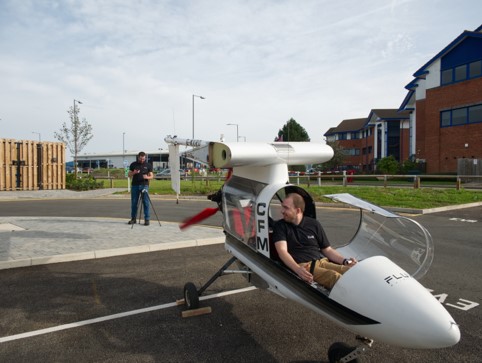
Solution
Already engaging with WMG through the Natwest funded Clean Transport Accelerator programme, the duo were made aware of WMG’s internship programme. They took on Design Engineer Intern, Aryan Bharmani with supervision from WMG’s Manikanta Ravi to create a series of processes and workflows that would maximise the benefit and accelerate the speed of implementing scanning technologies in the business.
Ultimately the process had to be customised to Flux’s needs and fully documented and tested. Aryan worked on configuring the scanner for optimal performance, testing it on engine bays, fuel tanks, fuselage, and mountings all at different resolutions. He designed an appropriate workflow from pre-processing all the way to post-processing scan data, including looking at ways to export scan data as stereolithography (STL) files by reducing size and without compromising quality to carry out design work in CAD software for conversion into solid bodies. Additional evaluation and verification work was carried out, as well as the creation of Standard Operating Procedures.

Impacts
· As a result of the internship project, Flux Aviation is now able to measure and design aircraft engine mount parameters using scanning technology with a deviation of less than 1%;
· The standard workflows produced by Aryan have given Flux the confidence to use scanning technology in the aircraft electrification process, eliminating the need to move the client aircraft from its owner’s hangar for retrofitting;
· The new scanning technology has reduced aircraft measuring time from four weeks to just two hours (a reduction of 99.7%) increasing the company bandwidth to deliver more client projects, accelerating the transition of aviation to zero-emission electric power;
· This new capability will enable Flux Aviation to conduct the aircraft electrification process outside the UK, opening up opportunities to sell in European markets;
· The project led to new quotations for projects worth £300k and the company are hoping to convert those as well as grow the order book by a further £300k in the next three months.
Testimonials
“The WMG internship programme has been incredibly helpful. We identified a gap in our capabilities and with the help of WMG experts and a highly skilled intern we were able to address it in a quick and cost-effective way. The programme requires minimum additional overhead for recruitment and ongoing management. It is an incredible resource for an SME like us and we would be delighted to use this programme again in the future.”
Radovan Gallo, CEO, Flux Aviation Ltd
“This internship provided valuable hands-on experience in cutting-edge technologies for electrifying aircraft, improved my technical skills, and contributed to my employability in the engineering field, particularly in areas related to design, scanning, and workflow optimisation.”
Aryan Bharmani, Design Engineer Intern
“WMG's Internship programme helped Flux Aviation identify the right talent to address its skill gap and accelerate their vision. It also helped Aryan to initiate his professional journey in the manufacturing world under an expert’s supervision, thereby contributing to the development of a skilled workforce in the UK.”
Manikanta Ravi, Engineer, Business Transformation, WMG
Notes
*Flux Aviation's most recent accolades are:
- Most promising solution by Innovation Zero
- Manufacturing Start-up by Made in the Midlands
- Cleantech Startup of the Year by the Midlands Startup Awards
For more information on Flux Aviation’s work and mission visit: Flux Aviation
For more information on working with WMG's SME team and internships email wmgsme@warwick.ac.uk
Flexing their operational muscles – Goodflex Rubber Ltd set to expand with new ERP system
“Our involvement with the Made Smarter programme gave us the confidence to move forward with one of biggest changes to the company in its 22-year history. This investment will not only allow us to improve our efficiencies but also provide us with the security to continue to grow in the future, aiding us to deliver even better products and services to our customers and ensure we remain a leader in the industry.”
Natalie Benwell, Commercial Manager, Goodflex Rubber Ltd
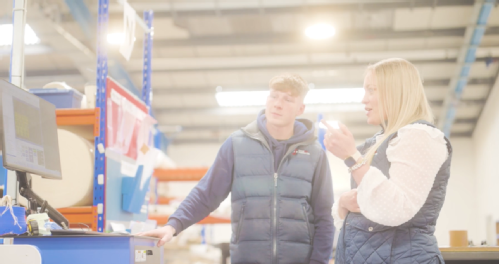
Warwickshire based Goodflex Rubber Ltd are world renowned manufacturers of high quality, bespoke-design silicone hoses, serving a range of industries including automotive, pharmaceutical, renewable energy, and food.
Challenge
Goodflex had plans to double their turnover over the next three years but were concerned that their Factory Management System was holding them back from achieving this growth. They had been using their current bespoke ERP system since the business was started and it had evolved over time to be used for multiple areas within the business, including material resource planning, accounts, stock management, work order management, invoicing, and delivery notes.
But they needed to move to software which would enable their day-to-day operations to be more efficient, allow them to respond more quickly to their customers and futureproof their processes.
Solution
Commercial manager Natalie Benwell got in touch with the Made Smarter West Midlands programme and was introduced to WMG’s Denis Pelych who quickly set about understanding the company’s specific requirements. It was clear that Goodflex needed an enhanced, futureproof, digital system to drive efficiencies and maintain control of some of their more complex product builds, but they were unsure what specific system to invest in.
Denis conducted a two-stage MRP and ERP* vendor selection process, with Made Smarter support and helped Goodflex select an ERP system that offered the capability they needed today, with a degree of futureproofing. The investment required was approximately £100k but Goodflex were able to access £20k with the help of a Made Smarter grant.
Natalie said:
“Denis understood and identified our needs better than we understood them ourselves and then successfully translated them into an RFP (Request for Proposal) that was such a true reflection of our business. His knowledge in the industry, not only opened our eyes to what was possible, but also took us down a route we never knew existed.”
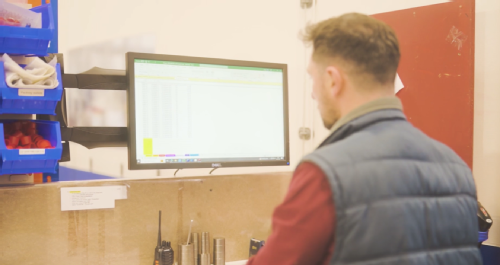
Impacts
- The new system will help Goodflex increase the speed of response to their customers
- The new system will help Goodflex double their revenue to £10m in three years, with the potential to reach £15-20m in five years, whilst maintaining margins and investment
- The system will lead to a 20-30% efficiency improvement from the automation of business processes
- The company expect to see a 15-20% improvement in material supply and stock efficiencies
- Efficiencies gained through the system will lead to higher levels of profitability
- The new system provides better management information with the ability to set KPIs and have greater operational insight in order to make data driven business decisions
- The new system will also improve Goodflex’s business development strategy enabled by greater insight into costs and opportunities
- The new system has improved workplace motivation and will help to retain and develop highly skilled staff
*ERP vs MRP: What’s The Difference? – Forbes Advisor
Read the full story on the Made Smarter website here.Link opens in a new window
Heating up for expansion with Eskimo Products
“WMG have been great to work with, they digested the brief, stuck to it, and delivered a great factory optimisation project. I was really impressed with the level of detail within the report and really enjoyed working alongside their engineers.”
Phil Ward, Managing Director, Eskimo Products Ltd
Background
Luxury radiator and towel rail design firm, Eskimo ProductsLink opens in a new window designs and manufactures a range of top end products with a focus on creating beautiful aesthetics within homes as well as being highly energy efficient. With a design office in Bristol and manufacturing space in Birmingham close to the international airport, the firm were setting their sights on growth and expansion.
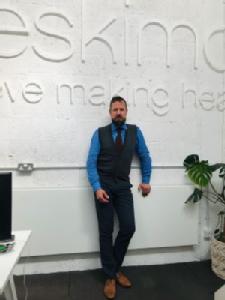
Challenge
The company had plans to move into a new factory in 2025 to scale up production following an increase in demand. They were looking for support to maximise the productivity potential of the layout in the new space and in the existing facility. They also needed support to digitise their manufacturing process.
Solution
Phil Ward, founder of the firm worked with WMG SME group’s Manikanta Ravi and Gun Gokmen to set up a project using Innovate UK Business GrowthLink opens in a new window (previously Innovate UK EDGE) funding with objectives to:
- Measure the current state of the factory to understand what was inhibiting target productivity
- Recommend improvements to increase capacity and reduce wastes on two key product lines (Column and Gordon) using lean methods and automation
The project would allow for a seamless transition and the opportunity to scope any new investments and potential changes before the move - essentially minimising any risks and to avoid any downtime.
Mani and Gun compared current capacity against the required capacity to meet the forecasted demand and identified that there was a shortfall. They performed bottleneck analysis for the overall process flow from customer order to raw materials, and manufacturing to customer delivery.
The extensive study allowed them to identify bottlenecks and areas for lean improvement, as well as make recommendations for where capacity could be enhanced such as an additional spindle tool to reduce CNC Machine setup time, standardising the setup of the powder coating process, improving lighting to reduce the number of re-works, introducing a new cell for assembling, testing and packing, adopting 5S workplace organisation methods and more advanced techniques such as automated welding with a suggested cycle time to meet demand. They recommended a phased approach for improving different areas overall, including welding, machining, and treatment.

Impacts
- Once implemented, WMG’s recommendations will reduce current bottleneck times by 72% per product on the Column product line and 43% on the Gordon line. So, for every 100 units made, 33 hours can be saved on the Column product line and 20 hours on the Gordon;
- As a result of the project, with the addition of robot welding and a pre-treatment plant, production capacity for the Column line will increase by 360% and for the Gordon line 37%;
- The improvements suggested will lead to estimated additional turnover of up to £365k per year;
- The company is now in a more informed position to make the move to the new space with automation and factory layout proposals that will help them meet capacity and grow the business.
Eskimo are currently working with other WMG colleagues through the Made Smarter West Midlands programme to implement the robotic welding process and will benefit from a grant to make this a reality. They are also embarking on a new WMG project for advice on the best manufacturing techniques and layout to take a new thermal energy storage product to market.

“It was great to work with the team at Eskimo to help them realise some of their growth ambitions through an improved factory layout. With the added digital capabilities proposed through Made Smarter West Midlands, there are even more opportunities for expansion. Innovate UK's Edge programme (Innovate UK Business Growth) helps businesses connect with the right expertise at whatever stage of growth they are at. We are excited to see where Eskimo goes next.”
Engineer Manikanta RaviLink opens in a new window and Industrial Engineer Gun GokmenLink opens in a new window, WMG University of Warwick
Investing in Digital leads to Brighter Future for ECAM Engineering
“Business has been amazing and last year we had our best year ever. Turnover was up 20% on the previous year.”
Phil Arme, Managing Director, ECAM Engineering Ltd
Background
ECAM Engineering began life in 1968 based on the Derbyshire/ Staffordshire border before moving to Cheadle in the Staffordshire Moorlands, near Stoke on Trent.They specialise in laser cutting, metal fabrication, CNC machining, welding, and painting. They worked with WMG recently through the Made Smarter West Midlands programme.
Challenge
Phil Arme, Managing Director at ECAM Engineering has been investing in the company’s digital transformation since he bought it ten years ago. Having already implemented one robotic welder in the business he wanted to explore automation further to increase productivity and to allow staff to develop skills in other areas.
“We recognised we needed to go down the road of having a second robot. I had read about the Made Smarter programme, and I thought it could help us make a decision about which robot would be best for us since we are not experts in that field.”
Solution
Through Tim Kirby at Made Smarter West Midlands, ECAM were introduced to WMG’s Ioan Lutas who set out a digital roadmap for ECAM with advice about how best to set in place a new Panasonic welding robot to help produce parts for key clients such as JCB.
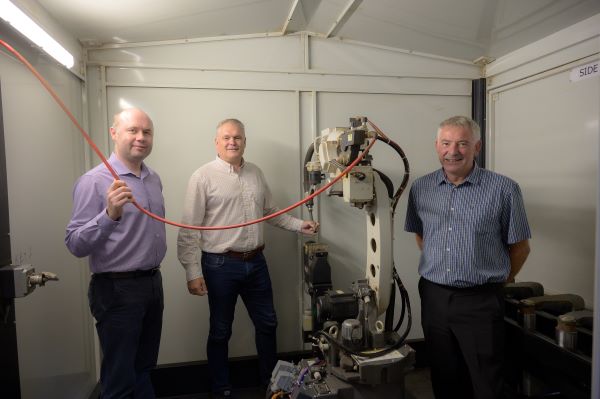
Impacts
The benefits of the second robot were noted immediately.
Overtime is no longer needed to complete jobs and the level of productivity is up
The robot has sped up processes and shift patterns have been changed to reflect this with staff now able to diversify their skills and work on other activities
ECAM went on to invest even further in digital technologies including a fully automated laser cutting machine
To read the full story visit:
https://www.madesmarter.uk/media/u0ahxjlt/made-smarter-case-study-ecam-engineering.pdf
And to see the video case study visit:
https://www.youtube.com/watch?v=4qdf4-GxnS4&t=2sLink opens in a new window
MyWorkwear - Looking good for the future
“In the last couple of months, we have almost doubled our output compared to 18-24 months ago and we can all see the benefits of the new system compared to our old processes. Our turnaround time has been reduced significantly and there are fewer mistakes to be corrected which is another bonus.”
Ben Simpson, Co-Managing Director, MyWorkwearLink opens in a new window
Challenge
Under the leadership of Managing Directors Ben Simpson and James Worthington, MyWorkwearLink opens in a new window, which was started in 1976, produces thousands of garments every week for companies large and small across the UK. Using state-of-the-art embroidery and print machines, the company adds logos, names and designs onto uniforms, workwear, teamwear, promotional items and other garments. The business also supplies PPE and non-personalised clothing from its 6,500 sq ft premises to its customers predominantly in the Midlands and nationwide.
MyWorkwear was growing rapidly and needed its internal systems to reflect the upsurge in orders.
Ben Simpson, Co-Managing Director, said: “Our systems were starting to struggle because we still had processes in place from a long time ago.”
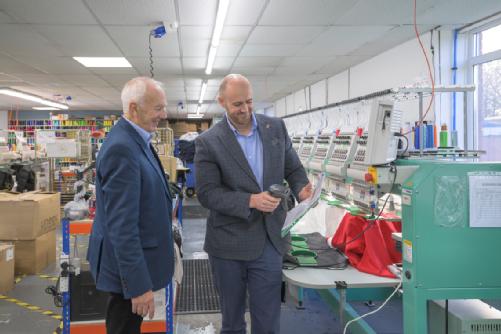
Solution
Working with partners at Made Smarter West Midlands, colleagues at WMG undertook a digital roadmap which led MyWorkwear to buy a specialist ERP system and software that involves the embroidery machines – which embroider many garments simultaneously – ‘talking’ to a central piece of software. It also enables staff to complete the colourisation and bar code scanning on the garments.
“The comprehensive digital roadmap that we carried out for the business highlighted areas which we felt would improve their productivity. We are delighted to have played a part in improving the digitalisation of MyWorkwear which is already leading to efficiencies, and they are a great example for other West Midlands businesses to follow.”
Onur Eren, Chief Engineer, WMGLink opens in a new window
Impact
Read more here about the project and the results here.Link opens in a new window
For more information about working with WMG's SME Group email wmgsme@warwick.ac.uk

Woodwork company nails success with more than £70k yearly savings with WMG
Background
Gordon Ellis & Co is a UK manufacturer of precision woodworking and rotational moulding. With more than 150 years of experience, the company has moved from horse and hand tools to today’s CNC precision woodworking machinery. Products include hospital bed frames, commodes, trolleys, high end audio equipment casings, and automotive wooden internal components. Their rota moulding products have a wide range of durable and weather resistant applications.
Challenge
Gordon Ellis & Co has been making quality wooden and rotational moulded products for many years. Although they’ve progressed massively from manual manufacturing practices to industrial machinery, they are now interested in stepping into the digital age.
Having met the WMG SME Group at a networking event, they were interested in getting their perspective for moving forward and building better. This would mean investigating a way of analysing the factory to discover how ‘digital manufacturing’ can create improvements. They hoped this would help them to make more products faster to meet their increasing customer demand.
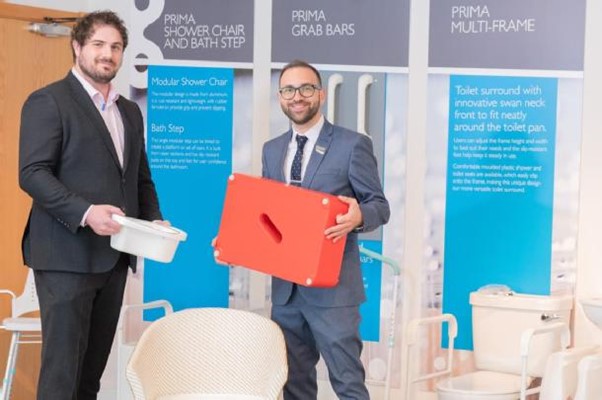
Solution
Digital manufacturing is often a thrown around buzz-phrase, but at WMG we aim to promote and explain just how much digital manufacturing can improve efficiency, productivity, and data collection. First things first, we wanted to make sure Gordon Ellis’s factory was prepared for the transition.
Rich Savidge, Technology Transfer Engineer at WMG, and Onur Eren, Innovation Manager, undertook a detailed investigation of the key facilities ‘current-state’, reviewing existing equipment, productivity, efficiency, and data outputs. Working with Gordon Ellis & Co, the team were able to propose a ‘future-state’, recognising equipment suitable for upgrade, targeting challenge areas and developing the businesses core capabilities.
The core impacts of the project saw reduced costs by eliminating material waste and promoting operational excellence methodologies. The team also recognised ways to introduce useful methods to gather data from their factory.
During this preliminary optimisation project, it was clear that digitisation would have a major improvement to Gordon Ellis & Co’s turnover while increasing their capability to stay competitive and enter luxury markets. The team worked hard to submit a Knowledge Transfer Partnership (KTP) bid that will gain them the funding they’d need to complete a two-year project to source an associate engineer to implement sensors and data collection devices around the factory. The beauty of a KTP is that it works in partnership with the externally employed graduate (the associate), and WMG utilising the facilities, expertise, and resources to see the project through to the end.
Impact
- The preliminary project ‘quick-wins’ saved the company £70k a year through waste elimination and the streamlining of internal procedures.
- More substantial gains will be had after the installation of state-of-the-art CNC equipment yielding an estimated gain in production capacity of x 4, de-risked by the team’s involvement.
- The Innovate UK KTP bid funding was successful and the project aims to increase the turnover of Gordon Ellis & Co by £540k over the next five years.
- Their savings will allow them to invest in the newly defined strategy, targeting industry 4.0 technologies that will enable sustainable growth
Rich Savidge, Technology Transfer Engineer, WMG, commented; “Working together, we were able to objectively define bottlenecks and target real production waste, preparing a journey for Gordon Ellis and their digitalisation journey. I am very pleased that they have won their KTP bid, and I can’t wait to see what they achieve in the next five years.”
Onur Eren, Innovation Manager, WMG, said: “I really enjoy projects like these because the team at Gordon Ellis were so open to our suggestions and were passionate about taking on the latest innovations before others in industry. I’m looking forward to supporting the digitalisation KTP over the next two years and beyond.”
Daniel Robinson, Financial Controller & Company Secretary, Gordon Ellis, added; “We’ve spent over 150 years in the industry, and we know it well, however, we are also looking to the future and seeing that we need to become more digital to continue to be innovative and competitive. WMG know digital and smart factories so well and we got support for the KTP that I wouldn’t have got anywhere else.”
